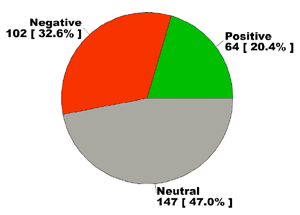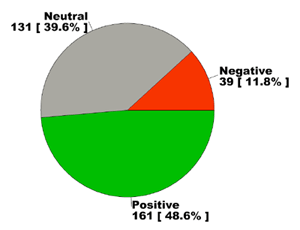Back in November, a number of us here at The Bivings Group were captivated by the Nintendo Wii and Sony PlayStation 3 launch – so much so, that we set up our ImpactWatch demo to follow the news about the two game systems. Now that both the launch and the Holiday Season have past, we decided to put together a report based on the ImpactWatch analysis and our own research. The following is a brief summary of our findings.
Sony PlayStation 3
 Prior to launch, it sounded like Sony’s PlayStation 3 had captivated the imaginations of the gaming world. While the Nintendo Wii was quietly building buzz, the media was all over the PlayStation 3 like a pack of wolves on a fresh kill. The hype surrounding the PlayStation 3 launch was staggering, and going into the Game Console Wars, a betting man probably would have put his money on Sony. With the success of the original PlayStation and the even greater success of the PlayStation 2, it seemed like it would be a slam-dunk for Sony. That turned out not to be the case. Three things that stood out about the media coverage of the PlayStation 3 were:
Prior to launch, it sounded like Sony’s PlayStation 3 had captivated the imaginations of the gaming world. While the Nintendo Wii was quietly building buzz, the media was all over the PlayStation 3 like a pack of wolves on a fresh kill. The hype surrounding the PlayStation 3 launch was staggering, and going into the Game Console Wars, a betting man probably would have put his money on Sony. With the success of the original PlayStation and the even greater success of the PlayStation 2, it seemed like it would be a slam-dunk for Sony. That turned out not to be the case. Three things that stood out about the media coverage of the PlayStation 3 were:
- PlayStation 3 Launch Sees Rampant Crime. Buying a video game system was never so dangerous. Due to massive hype-driven demand, combined with severe supply constraints, the launch of the PlayStation 3 was tainted by theft and violent crime that spanned the globe.
- Sony PR and Management Blunders Abound. From Sony's decision to include the Blu-Ray high-definition DVD drive, thus delaying the launch by almost a year, to Sony Australia's General Manager, Nic Foster saying “Wii is a core gaming device. It's a more fun, intuitive sort of product to pick up,” to Sony’s press release falsely claiming that they had won a Technology and Entertainment Emmy for the SIXAXIS controller, they managed to fumble the PR ball on every play.
- Developers Jump Ship, Express Angst. Reports show Sony failed to cater sufficiently to non-Sony game developers. They lost the platform exclusivity of the best selling game of all time (Grand Theft Auto) and alienated their third party developers to such an extent that the launch line-up consisted of only a handful of titles. Gabe Newell of Valve Software said that, “The PS3 is a total disaster on so many levels, I think it's really clear that Sony lost track of what customers and what developers wanted.”
Nintendo Wii
 The Nintendo Wii can be described as the underdog going into the Game Console Wars. Initially, both Sony and Microsoft felt that it was not a direct competitor. Their machines targeted hard-core gamers, who are interested in the most realistic gaming experience, the best sound, and greatest speed. The Wii was considered more of toy targeted towards younger gamers. It turned out that the Wii was a more direct competitor than anticipated.
The Nintendo Wii can be described as the underdog going into the Game Console Wars. Initially, both Sony and Microsoft felt that it was not a direct competitor. Their machines targeted hard-core gamers, who are interested in the most realistic gaming experience, the best sound, and greatest speed. The Wii was considered more of toy targeted towards younger gamers. It turned out that the Wii was a more direct competitor than anticipated.
Three thing that helped to shape the brand perceptions consumers have about the Wii were:
- Media Stardom. The Nintendo Wii rapidly ascended to become a pop-cultural icon. From the beginning, the Wii was a media darling, earning free coverage in editorials, radio station contests, and television shows – including being prominently featured in episodes of South Park and The Colbert Report, as well as being given away to every audience member on an episode of Dr. Phil.
- Strapgate. In a public relations coup d’etat, Nintendo managed to turn a potentially damaging quality issue into a resounding brand victory. Within a week of the Wii’s launch, reports began to surface about Wii remotes slipping out of gamers’ hands and the security straps breaking. Nintendo responded promptly and decisively, announcing an investigation and voluntary recall of the straps. What could have turned into a significant issue managed to help solidify the Nintendo brand in the eyes of consumers.
- Broad Demographic Appeal. Nintendo's NES gaming console was an 80's icon and many people that were kids playing their NES console in the 80's are now in their 30's and want to relive the fun of their youth. In a piece on 1up.com, Nintendo's Senior VP of Marketing, George Harrison, cites a 2006 survey by the Entertainment Software Association revealed that 25 percent of all gamers are 50 or older. Of the three next-generation game consoles, only the Wii has been positioned to really target such emerging market segments.
If you are interested in reading the full report, click here to download it as a PDF.
If you would like access to the ImpactWatch demo set up to track this issue, click here to request a username and password.
 Prior to launch, it sounded like Sony’s PlayStation 3 had captivated the imaginations of the gaming world. While the Nintendo Wii was quietly building buzz, the media was all over the PlayStation 3 like a pack of wolves on a fresh kill. The hype surrounding the PlayStation 3 launch was staggering, and going into the Game Console Wars, a betting man probably would have put his money on Sony. With the success of the original PlayStation and the even greater success of the PlayStation 2, it seemed like it would be a slam-dunk for Sony. That turned out not to be the case. Three things that stood out about the media coverage of the PlayStation 3 were:
Prior to launch, it sounded like Sony’s PlayStation 3 had captivated the imaginations of the gaming world. While the Nintendo Wii was quietly building buzz, the media was all over the PlayStation 3 like a pack of wolves on a fresh kill. The hype surrounding the PlayStation 3 launch was staggering, and going into the Game Console Wars, a betting man probably would have put his money on Sony. With the success of the original PlayStation and the even greater success of the PlayStation 2, it seemed like it would be a slam-dunk for Sony. That turned out not to be the case. Three things that stood out about the media coverage of the PlayStation 3 were:  The Nintendo Wii can be described as the underdog going into the Game Console Wars. Initially, both Sony and Microsoft felt that it was not a direct competitor. Their machines targeted hard-core gamers, who are interested in the most realistic gaming experience, the best sound, and greatest speed. The Wii was considered more of toy targeted towards younger gamers. It turned out that the Wii was a more direct competitor than anticipated.
The Nintendo Wii can be described as the underdog going into the Game Console Wars. Initially, both Sony and Microsoft felt that it was not a direct competitor. Their machines targeted hard-core gamers, who are interested in the most realistic gaming experience, the best sound, and greatest speed. The Wii was considered more of toy targeted towards younger gamers. It turned out that the Wii was a more direct competitor than anticipated.